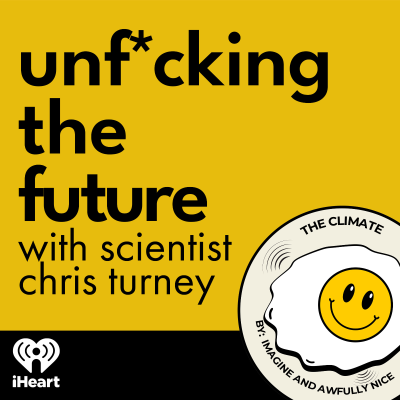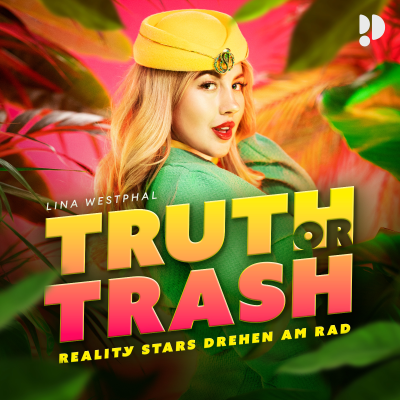
Unf*cking the Future
Podcast von iHeartPodcasts
Diesen Podcast kannst du überall hören, wo es Podcasts gibt und auch ohne Mitgliedschaft in der Podimo App.
Alle Folgen
13 FolgenDid you know that one of the most effective absorbers of carbon dioxide is... seaweed? Sanjayan, the CEO of Conservation International, joins the show to talk about how we can harness the power of the ocean to slow the impacts of global heating. Show notes from Chris: * The world’s oceans are crucial for the health of our planet, helping regulate the climate and global carbon budget. The London School of Economics has a great explainer [https://www.lse.ac.uk/granthaminstitute/explainers/what-role-do-the-oceans-play-in-regulating-the-climate-and-supporting-life-on-earth/#:~:text=They%20contribute%20to%20climate%20regulation,as%20the%20blue%20economy%EF%BB%BF%20]. Coastal ecosystems are super important. Mangrove forests and seagrass meadows are incredibly effective at locking up carbon, helping limit the amount of global heating. The US National Oceanic and Atmospheric Administration (or NOAA for short) has a fabulous 101 here [https://oceanservice.noaa.gov/ecosystems/coastal-blue-carbon/#:~:text=Salt%20marshes%2C%20mangroves%2C%20and%20seagrass,hundreds%20to%20thousands%20of%20years]. * Conservation International [https://www.conservation.org/] are doing amazing work with communities around the world to protect nature. You can learn more about the inspiring Vida Manglar “Blue Carbon” Project in Columbia on their website [https://www.conservation.org/projects/vida-manglar-carbon-project#:~:text=Vida%20Manglar%20(Spanish%20for%20%27mangrove,essential%20for%20climate%20change%20mitigation]. * There are so many fantastic community projects around the world that bring people together to work on nature-based solutions. Search online for a group near you. For those in California, check out Tree People [https://www.treepeople.org/] and Friends of the LA River [https://folar.org/]. And of course, wherever you are, there is the brilliant Support and Feed [https://supportandfeed.org/], founded by Maggie Baird. Sign up today to eat at least one plant-based meal a day for 30 days. Take the pledge today [https://supportandfeed.org/pledge/]. See omnystudio.com/listener [https://omnystudio.com/listener] for privacy information.
As the world heats up, our cities need to adapt. Today we speak with Thai landscape architect Kotchakorn Voraakhom on how she's designing new, more resilient urban environments in her homebase of Bangkok. Show notes from Chris: * Sadly, our cities are increasingly vulnerable to global heating. Flooding, heatwaves, storms, rising sea level, poor planning, and our over reliance on concrete are conspiring to make cities less resilient to climate shocks. But nature-based solutions – think parks, green spaces and tree-lined avenues to name but a few – offer positive solutions. The mayors of nearly 100 cities around the world have come together as C40 to tackle the climate crisis and have put together a great overview [https://www.c40knowledgehub.org/s/article/Nature-based-solutions-How-cities-can-use-nature-to-manage-climate-risks?language=en_US#:~:text=Nature%2Dbased%20solutions%20can%20help,help%20to%20improve%20urban%20ventilation] of what they’re doing. A term you’re going to hear more about with cities is “sponginess”. Rather than using concrete to channel water, “sponge cities” work with nature to manage rainwater. This is a fascinating article [https://www.arup.com/perspectives/sponginess-and-why-it-matters#] on how some of the world’s cities compare. * You can see Kotchakorn’s awe-inspiring Bangkok park in her beautiful TED talk here [https://www.ted.com/talks/kotchakorn_voraakhom_how_to_transform_sinking_cities_into_landscapes_that_fight_floods?hasSummary=true&language=en]. There is a wonderful interview [https://www.weforum.org/agenda/2018/09/bangkok-has-created-a-sponge-park-to-combat-future-flooding/] with Kotchakorn about the Chulalongkorn University Centenary Park. * To learn more about The Nature Conservancy and how they can help you tackle the climate and biodiversity crises, check out their fantastic website [https://www.nature.org/en-us/]. See omnystudio.com/listener [https://omnystudio.com/listener] for privacy information.
For decades, Western governments have pursued policies of fire suppression. But researchers like Glynis Humphrey have shown that these methods don't work – especially as global heating worsens wildfire risks. Today, Glynis joins the show to talk about wildfire management, and what we can learn from the traditional practices of Indigenous communities around the world. Show notes from Chris: * Glynis is an author of an excellent but sobering United Nation’s report on how wildfires are becoming more intense and frequent. You can download “Spreading like Wildfire: The Rising Threat of Extraordinary Landscape Fires [https://www.unep.org/resources/report/spreading-wildfire-rising-threat-extraordinary-landscape-fires]” for free. But this report also gives hope: Indigenous and traditional knowledge can help prevent and reduce the impact of wildfires in a hotter world. * There are some heartbreaking (and compassionate) movies on wildfires. Rebuilding Paradise (2020) [https://youtu.be/RNzqZS41fB4?si=OgliXbw3p2Skf7YJ] directed by Ron Howard and Fire Front (2022) [https://youtu.be/KnspzOYwY0Y?si=t9VmB9TCl7rYwH4N] directed by Eddie Martin are powerful documentaries that capture the devastating impacts of wildfires and the terrific importance of community. * If you want to find out how best to plan for and respond to wildfires, there are a wealth of resources online. Some excellent examples are the New South Wales Rural Fire Service [https://www.rfs.nsw.gov.au/] (the NSW RFS for short) and the California Department of Forestry and Fire Protection [http://readyforwildfire.org/] (aka CAL FIRE). These websites are packed with life-saving information. * For those wanting to learn more about the Australian “dinosaur trees”, the Wollemi Pine, there is an excellent recent article [https://www.abc.net.au/news/2024-02-06/the-wollemi-pine-dinosaur-tree-was-long-thought-extinct/103292808] by the ABC. You can see how close the fires of 2019-2020 came to destroying these amazing trees by clicking here [https://www.theguardian.com/australia-news/2020/jan/15/dinosaur-trees-firefighters-save-endangered-wollemi-pines-from-nsw-bushfires]. The movie in this article has extraordinary footage. See omnystudio.com/listener [https://omnystudio.com/listener] for privacy information.
Nobody knows how to make complicated concepts easier to understand than Bill Nye The Science Guy. In this episode, he and Chris break down tough questions about the science of global heating and how to communicate the answers to others. Show notes from Chris: * A big take home message from this week’s show is there is almost complete scientific agreement that global heating is caused by us (humans, if you’re wondering). Recent work looking at nearly 90,000 scientific studies shows that more than 99.9% of scientists agree! Here’s a great summary [https://news.cornell.edu/stories/2021/10/more-999-studies-agree-humans-caused-climate-change]from Cornell University. * There are some big myths out there about effective climate action. We really need everyone pulling in the same direction to get the biggest return on all our efforts. Check out this fascinating myth-busting article in The Washington Post, “You’re doing it wrong: Recycling and other myths about tackling climate change [https://www.washingtonpost.com/climate-solutions/2023/08/28/climate-action-poll/]”. But remember, recycling does make a real difference to the environment. It’s just that on its own, recycling is not going to get us to where we need to be with cutting carbon pollution. Closer to home, I’m incredibly honored to serve on the Board of the Environment Protection Authority in the state of New South Wales. The EPA is leading the charge in Australia on climate action and recycling. You can learn more about why it matters by clicking here [https://www.epa.nsw.gov.au/]. * To help keep the planet from dangerously overheating, we will have to drawdown billions of tonnes of carbon from the atmosphere. What’s known as “carbon capture” will be terrifically important in the future. There is a lot of confusion about what this means. An eye-watering amount of public money has been wasted failing to show it’s possible to capture carbon at the source of the pollution – think fossil fuel power stations and gas fields – and then bury it underground. But carbon dioxide removal is going to be a big part of the solution. Friends of mine at Common Capital have written a fabulous report on this approach for the New South Wales Government that is free to download [https://www.energy.nsw.gov.au/sites/default/files/2024-02/Common_Capital_Scaling_atmospheric_CDR_in_NSW_Final.pdf]. Full disclosure, I’m affiliated with the Climate Recovery Institute (CRI) who supported some of the research. * You can learn about the short-lived but potent greenhouse gas methane from Bill Nye and the Environmental Defence Fund (including a fantastic video) by clicking here [https://vitalsigns.edf.org/story/bill-nye-climate-guy]. * And finally, Maggie mentioned a great article on why humor is so important for engaging people on climate action. Click on this link [https://theconversation.com/a-little-humour-may-help-with-climate-change-gloom-125860] to find out more. See omnystudio.com/listener [https://omnystudio.com/listener] for privacy information.
It’s hard to solve a problem when some people don’t even believe that it exists. Researcher Cailin O’Connor joins to talk about the spread of climate misinformation- and what we can do about it. Show notes from Chris: * Sadly, action on the climate crisis has been badly delayed by huge amounts of disinformation and misinformation, and much of it orchestrated by the fossil fuel industry. If you want to learn more, the groundbreaking book “Merchants of Doubt: How a Handful of Scientists Obscured the Truth on Issues from Tobacco Smoke to Global Warming [https://www.merchantsofdoubt.org/]” by Naomi Oreskes and Erik Conway is an absolute must-read. * Click here [https://ossfoundation.org/projects/environment/global-warming/myths/revelle-gore-singer-lindzen/] for a very powerful article about what happened between Fred Singer and Roger Revelle. * Cailin O’Connor and James Owen Weatherall’s wonderfully insightful and hugely readable book is “The Misinformation Age: How False Beliefs Spread [https://yalebooks.yale.edu/book/9780300251852/the-misinformation-age/]”. I can’t recommend it enough. * Other great advice on how to beat misinformation is by treating it as a ‘virus’, described in the fascinating book “Foolproof” by Sander van der Linden. One super promising approach is to ‘inoculate’ ourselves by debunking misinformation before it takes hold. There’s a great review and summary here [https://amp.theguardian.com/books/2023/feb/12/foolproof-by-sander-van-der-linden-review-how-to-defuse-fake-news]. * Oh, and that argument about bird kills and wind farms? Recent work by Erik Katovich has published a US-wide study in the scientific journal Environmental Science & Technology and found no measurable impact on bird populations around wind turbines. But this study [https://ekatovich.github.io/files/Katovich_Birds_and_Energy_Infrastructure_PrePrint.pdf] found a 15% decline around fossil fuel developments, like shale oil and gas production, the opposite to what’s often claimed… See omnystudio.com/listener [https://omnystudio.com/listener] for privacy information.
Nutze Podimo überall
Höre Podimo auf deinem Smartphone, Tablet, Computer oder im Auto!
Ein ganzes Universum für Unterhaltung für die Ohren
Tausende Hörbücher und exklusive Podcasts
Ohne Werbung
Verschwende keine Zeit mit Werbeunterbrechungen, wenn du bei Podimo hörst

































